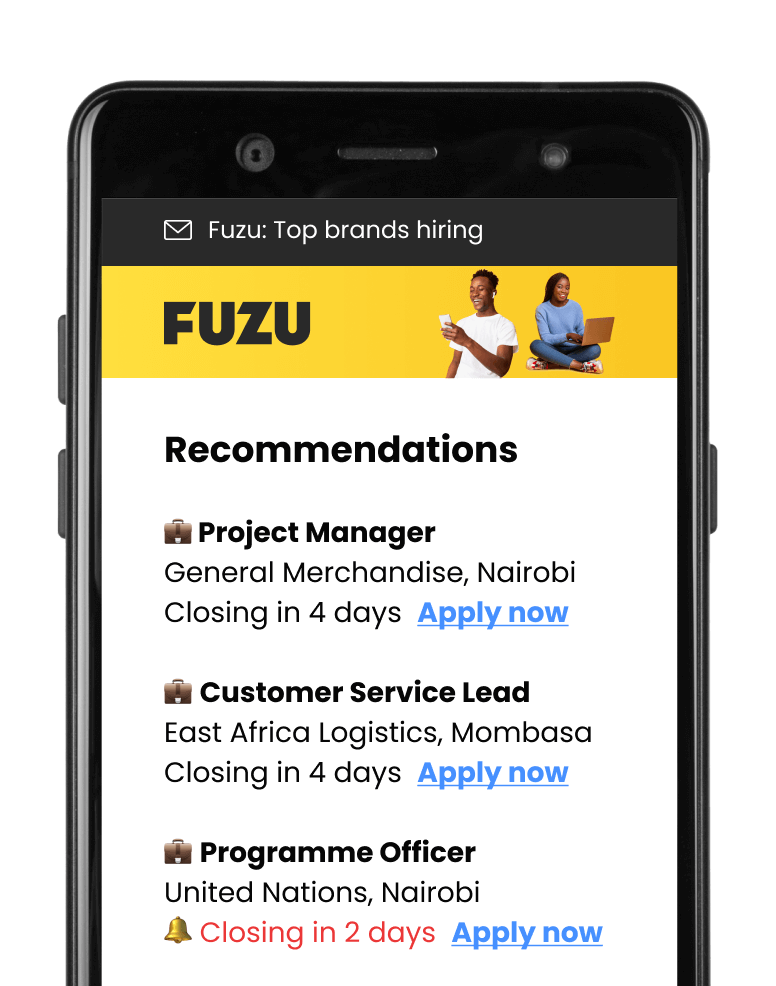Partner Qualifications
- Be a registered Community Based Organization (CBO) operating in the Kakuma Kalobeyei and surrounding Host communities for the last 5 years
- Evidence of managing and implementing donor funded projects for at least 3 years of USD 5000 and above.
- Must have implemented a similar digital skills project in the past with evidence of beneficiaries transition to online work.
- Clear demonstrated understanding of the Gig economy ( Trainers/ Mentors should be active participants of online gigs)
- Ability to design and deliver a digital training curriculum (Short courses - 3 months and long courses - 6 months)
- Clear demonstrated understanding of donor reporting requirements (Templates, timelines)
- A clear detailed profile of organization operations, human resource and thematic areas of operation.
- Have clear policies and staff commitment to safeguarding, as well as necessary structures and procedures in place to respond effectively to safeguarding issues and concerns.
- Commitment to and understanding of how to take a do no harm approach to promote safety, security, and inclusivity.
- Have sound anti-discrimination principles and codes of conduct
- Commitment to learning and ability to be flexible in programming and operations to truly commit to change. WUSC seeks partners that are willing to accommodate change, adapt practices and approaches, and engage in ongoing dialogue and evolution in the partnership based on context, time limits, and review/ renewal processes, and are willing to have discussions around any deeply entrenched structural inequalities, racism and power imbalances, if and when they may arise.
- Aligned with this purpose, the digital skills and online jobs implementing CBO will play the following roles: review the digital skills training and access to jobs model; and develop and design a cost effective, gender-responsive training model for the project and `be a leader in training and supporting Adolescent Girls and Young Women (AGYW) to enter the digital economy. The partner will work in close collaboration with the WUSC LEAP project teams based in Nairobi and Kakuma who will oversee the project.
- Specifically, the mandate of the implementing partner is to:
Training design and model
- Conduct a digital labour market assessment and trainees needs assessment to inform development of a cost effective and scalable digital skills business model.
- Work with a pre-qualified TVET institution in the delivery of an internationally recognized digital literacy certification.
- Co-create, update and customize gender responsive training curricula on digital skills, online jobs, and soft skills.
- Develop recruitment and selection criteria for trainees in consultation with WUSC, and recruit trainees for the program.
- Identify and select trainees – lead trainee selection process, working in collaboration with WUSC and other LEAP Project partners as needed.
- Provide job mentorship to graduates
- Conduct project monitoring and evaluation, revenue tracking and document success stories
Training - Young Women Empowerment
- Deliver training to identified young women using customised curriculum and support trainees to develop online profiles and bid for online jobs.
- Support trainees with linkages to credible local and international online job platforms. This includes a minimum of 3-month mentorship support to help trainees identify, bid for work and deliver quality jobs as well as receive payment for work done.
- Provide gender sensitive training and mentorship support to a minimum of 120 adolescent girls and young women, with a target of 70% of young women earning income through online freelance work
- Conduct gender-responsive skills training covering the areas of basic digital skills (covering those areas identified through labour market assessments), how to obtain online freelance work, entrepreneurship in the context of online work, and life skills
- Provide gender-sensitive support and appropriate referral pathways for those who are survivors of SGBV.
Mentorship
- Provide mentorship for young women to help them bid and perform online jobs
- In collaboration with the WUSC team, conduct outreach with the family members of the trainees and the broader community to garner support for women’s and girl’s use of technology and inclusion in the gig economy
Sustainability
- Work closely with the WUSC staff to build the capacity of 2 business units, ensure a good governance structure of the units is in place and provide linkages to financial services.
- Provide information to trained AGYW on online work regulation and best practices.
- Support graduates to open bank accounts with credible financial institutions and online wallets.
- Organize graduates to form, register and operationalize 1 business units for digital online workers
Quality Control and Impact Measurement
- Provide oversight and ensure quality during online job bidding and execution to ensure that trainees have adequate support.
- Collaborate with the WUSC MERL team to monitor the training, mentorship and online job status, using a result-based monitoring system.
- Provide data and information required by MERL on impact assessment.
- Conduct outreach with parents, teachers, and community leaders, particularly men and boys, to foster a supportive environment for young women’s employment and to mitigate against risk of SGBV.
- Collaborate with WUSC MERL in conducting assessments with men and boys, particularly male spouses or partners, to identify and address gender roles and joint decision-making regarding young women's employment pathways.
- Develop a detailed work plan.
- Provide monthly financial reports and quarterly technical reports as required.


